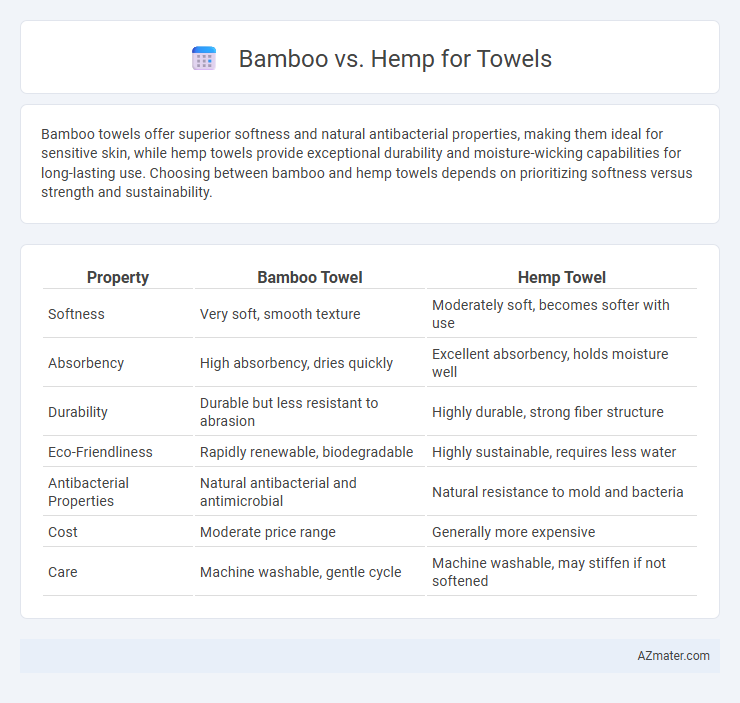Bamboo towels offer superior softness and natural antibacterial properties, making them ideal for sensitive skin, while hemp towels provide exceptional durability and moisture-wicking capabilities for long-lasting use. Choosing between bamboo and hemp towels depends on prioritizing softness versus strength and sustainability.
Table of Comparison
| Property | Bamboo Towel | Hemp Towel |
|---|---|---|
| Softness | Very soft, smooth texture | Moderately soft, becomes softer with use |
| Absorbency | High absorbency, dries quickly | Excellent absorbency, holds moisture well |
| Durability | Durable but less resistant to abrasion | Highly durable, strong fiber structure |
| Eco-Friendliness | Rapidly renewable, biodegradable | Highly sustainable, requires less water |
| Antibacterial Properties | Natural antibacterial and antimicrobial | Natural resistance to mold and bacteria |
| Cost | Moderate price range | Generally more expensive |
| Care | Machine washable, gentle cycle | Machine washable, may stiffen if not softened |
Introduction to Bamboo and Hemp Towels
Bamboo towels offer natural antibacterial properties, exceptional softness, and superior absorbency, making them ideal for sensitive skin and eco-conscious consumers. Hemp towels provide remarkable durability, breathability, and moisture-wicking abilities due to their strong fibers, which also resist mildew and offer UV protection. Both fabrics are sustainable, but bamboo grows faster, while hemp requires fewer pesticides, making each choice environmentally friendly yet functionally distinct.
Material Origins: Bamboo vs. Hemp
Bamboo towels are made from the pulp of bamboo grass, a fast-growing, renewable resource known for its natural antibacterial properties and softness. Hemp towels originate from the fibrous stalks of the hemp plant, celebrated for its durability, breathability, and resistance to mold and UV rays. Both materials offer sustainable alternatives to traditional cotton, with bamboo providing a silky texture and hemp delivering a rugged, eco-friendly fabric ideal for long-lasting use.
Environmental Sustainability Comparison
Bamboo towels offer rapid renewability due to bamboo's fast growth rate and require fewer pesticides compared to conventional cotton. Hemp towels provide superior soil regeneration benefits, requiring minimal water and no synthetic fertilizers, making hemp cultivation highly sustainable. Both fibers are biodegradable and reduce environmental impact, but hemp's lower water consumption and enhanced carbon sequestration give it an edge in sustainability metrics.
Absorbency and Drying Capabilities
Bamboo towels excel in absorbency due to their natural micro-gaps in fibers that trap moisture efficiently, making them highly effective for quick water absorption. Hemp towels offer superior durability while maintaining strong absorbency, absorbing up to 20% more water than cotton fabrics. Bamboo fibers dry faster than hemp, enhancing breathability and reducing the risk of mildew, whereas hemp towels, though slower to dry, remain odor-resistant and durable through repeated use.
Softness and Texture Differences
Bamboo towels offer a luxuriously soft texture due to their naturally smooth fibers, making them gentle on sensitive skin and highly absorbent. Hemp towels, while coarser initially, become increasingly soft and durable with each wash, providing a more textured and rustic feel. The inherent moisture-wicking properties of bamboo contrast with hemp's sturdy fabric structure, influencing user preference based on comfort and long-term use.
Durability and Longevity
Bamboo towels exhibit exceptional durability due to their naturally strong fibers, resisting wear and tear better than many traditional fabrics. Hemp towels outlast most materials through sustained use, boasting resistance to mildew and stretching, which extends their longevity significantly. Both natural fibers offer eco-friendly, long-lasting towel options, but hemp's robustness typically surpasses bamboo in durability and lifespan.
Hypoallergenic and Antibacterial Properties
Bamboo towels exhibit strong hypoallergenic properties due to the natural presence of bamboo kun, which effectively reduces the likelihood of allergic reactions and skin irritation. Hemp towels also offer antibacterial benefits, containing cannabinoids and terpenes that inhibit bacterial growth, making them suitable for sensitive skin. Both materials provide excellent antimicrobial properties, but bamboo's smoother fiber texture often results in a gentler feel on the skin compared to the coarser hemp fibers.
Care and Maintenance Requirements
Bamboo towels require gentle care with cold water washing and mild detergents to preserve their softness and absorbency, avoiding bleach or fabric softeners that can degrade fibers. Hemp towels demand slightly more robust maintenance, benefiting from warm water washes and occasional vinegar rinses to remove residue and maintain antibacterial properties, while also avoiding harsh chemicals. Both towels should be air-dried or tumble-dried on low heat to extend longevity and prevent fiber damage.
Cost Considerations
Bamboo towels typically have a higher upfront cost due to the processing required to convert bamboo into soft fiber, but they offer durability and natural antibacterial properties that can reduce long-term replacement expenses. Hemp towels are generally more affordable and highly durable, providing excellent absorbency while requiring less chemical processing, which can lower production costs. Evaluating cost considerations involves weighing the initial price against factors like longevity, maintenance, and environmental impact in selecting between bamboo and hemp towels.
Conclusion: Which Towel Material Is Best?
Bamboo towels offer exceptional softness, natural antibacterial properties, and excellent moisture-wicking capabilities, making them ideal for sensitive skin and quick drying. Hemp towels provide superior durability, environmental sustainability, and increased absorbency as fibers soften over time, catering to those seeking long-lasting, eco-friendly options. Considering factors like softness, durability, absorbency, and ecological impact helps determine the best towel material based on personal priorities and usage needs.

Infographic: Bamboo vs Hemp for Towel
 azmater.com
azmater.com